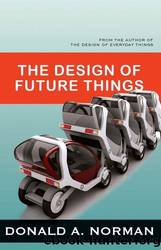The Design of Future Things by Norman Donald A

Author:Norman, Donald A. [Norman, Donald A.]
Language: eng
Format: epub
Tags: Business, Psychology, Science
ISBN: 9780465013036
Amazon: B06XC86LC1
Goodreads: 18688837
Publisher: Basic Books
Published: 2006-01-01T08:00:00+00:00
The Problem of Inappropriate Automation
I once argued that the current state of automation was fundamentally unsound because it was in the dangerous middle ground, neither fully automated nor fully manual. Either have no automation or full automation, I argued, but what we have today is halfway automation. Even worse, the system takes over when the going is easy and gives up, usually without any warning, when the going gets toughâjust the reverse of what you would want.
If an airplane pilot or car driver is aware of the vehicleâs state, the environment, and the location and condition of all other vehicles and, moreover, is continually reacting and interpreting this information, the person is an essential part of the control loop: perceiving the situation, deciding upon an appropriate action to take, executing that action, and then monitoring the result. You are âin the loopâ every time you drive your car with care, paying full attention to all that is happening around you. For that matter, you are in the loop while cooking, washing, or even playing a video game, as long as you are continually involved in judging the situation, deciding what to do, and evaluating the result.
A closely related concept is that of situation awareness, which refers to a personâs knowledge of the context, the current state of things, and what might happen next. In theory, a person could still be in the loop, stay fully aware of the situation, even with completely automated equipment, by continually monitoring the vehicleâs actions and assessing the situation, being ready to step in when needed. This passive observation is not very rewarding, however, especially as airplane pilots and automobile drivers might have to maintain this state for many hours on long-distance trips. In experimental psychology, this situation is often called vigilance, and the experimental and theoretical studies of vigilance demonstrate deterioration in performance with time. People just canât keep focused on mindless tasks for very long.
When people are âout of the loop,â they are no longer informed. If something goes wrong and immediate response is required, they cannot provide it effectively. Instead, considerable time and effort is required to get back âinto the loop,â and by then, it may be too late.
A second problem with automated equipment is the tendency to rely on the automation, even when there are difficulties with it. Two British psychologists, Neville Stanton and Mark Young of Brunel University, studied drivers using adaptive cruise control in an automobile simulator. They found that when the automation worked, things were fine, but when the adaptive cruise control failed, the drivers had more accidents than did drivers without the fancy technology. This is a common finding: safety equipment does indeed increase safety, until it fails. When people learn to rely upon automation, they are not only out of the loop but often too trusting of the automation. When it fails, they are less likely to catch problems than they would be if they didnât have automated equipment at all. This phenomenon has been found in every domain studied, be it among airline pilots, train operators, or automobile drivers.
Download
This site does not store any files on its server. We only index and link to content provided by other sites. Please contact the content providers to delete copyright contents if any and email us, we'll remove relevant links or contents immediately.
Whiskies Galore by Ian Buxton(41982)
Introduction to Aircraft Design (Cambridge Aerospace Series) by John P. Fielding(33113)
Small Unmanned Fixed-wing Aircraft Design by Andrew J. Keane Andras Sobester James P. Scanlan & András Sóbester & James P. Scanlan(32788)
Craft Beer for the Homebrewer by Michael Agnew(18228)
Turbulence by E. J. Noyes(8014)
The Complete Stick Figure Physics Tutorials by Allen Sarah(7361)
The Thirst by Nesbo Jo(6921)
Kaplan MCAT General Chemistry Review by Kaplan(6919)
Bad Blood by John Carreyrou(6608)
Modelling of Convective Heat and Mass Transfer in Rotating Flows by Igor V. Shevchuk(6426)
Learning SQL by Alan Beaulieu(6272)
Weapons of Math Destruction by Cathy O'Neil(6258)
Man-made Catastrophes and Risk Information Concealment by Dmitry Chernov & Didier Sornette(5995)
Digital Minimalism by Cal Newport;(5743)
Life 3.0: Being Human in the Age of Artificial Intelligence by Tegmark Max(5539)
iGen by Jean M. Twenge(5401)
Secrets of Antigravity Propulsion: Tesla, UFOs, and Classified Aerospace Technology by Ph.D. Paul A. Laviolette(5363)
Design of Trajectory Optimization Approach for Space Maneuver Vehicle Skip Entry Problems by Runqi Chai & Al Savvaris & Antonios Tsourdos & Senchun Chai(5061)
Pale Blue Dot by Carl Sagan(4992)
